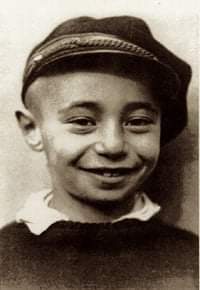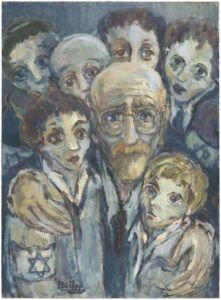This section features the true experiences of Holocaust Survivors.
This month we are featuring the experience of a Holocaust Survivor who lived here in Israel, but who sadly has passed away today.
~ Izio ~
Izio – the last boy from the Korczaks Orphanage died Friday Jan 22, 2021, in Israel.
Izio – Itzchak Belfer was born in February 1923 in Warsaw, Poland. His father was a simple merchant and his mother took care of six children. Itzchak lost his father when he was four years old and the family’s financial situation deteriorated. The family lived together with his grandparents in a small house in Warsaw’s suburbs. Itzchak was given his first education in a “Heder”. When he was seven years old in 1930 in light of the family’s financial situation and the will to give Itzchak a meaningful education, his mother decided to try and apply to Janusz Korczak special orphanage home. Janusz Korczak interviewed Izio – Itzchak and his mother briefly and then decided to accept Itzchak to his orphanage home.
Itzchak has had 7 most wonderful and meaningful years in Dom Sierot Orphanage at 92 Krochmalna street in Warsaw. During those years he studied in a local school and lived in the orphanage home with 104 children of different ages. Itzchak visited his family regularly during those years. Pani Stefa, Stefa Wilczynska encouraged and supported Itzchak to start drawing, hence he began his first steps in this field at the orphanage.
When World War II broke out (1939), Itzchak succeeded in passing the border to Russia to a place called Malkini where Polish refugees gathered in a refugee camp. He moved east and was working as a coal miner in the Ural Mountains till the beginning of 1941. Then he migrated to Tashkent where he was drafted to the Red Army and was stationed in one of the cavalry regiments. When the battalion was disarmed Itzchak was sent to work in a factory until the war ended.
After WWII ended, in 1946 Itzchak returned to Warsaw hoping to find his family however, there he realized the magnitude of the disaster. Itzchak found Warsaw in ruins, thus understanding that neither his close family nor the orphanage home had survived. Everyone he knew was murdered in Treblinka concentration camp.
Itzchak began his wandering through Europe, heading Eretz Israel. From Poland he went to Czechoslovakia, then to Austria and finally to Italy. On his way he was in several DP camps. In Genoa Itzchak joined the group of refugees who went on the “Af Al Pi Chen” illigal imigrant ship to Eretz Israel. However in September of 1947 the British captured the Af Al Pi Chen and its 434 passengers were sent to detention camp on Cyprus. Today this ship is stationed in the entrance of the city of Haifa and is used as a museum that illustrates the illegal immigration to Israel towards the end of the British Mandate period. Itzchak had stayed in Cyprus for two years (1947-1948), and there he expanded his artistic education in sketching and sculpting with the help of the sculptor Zeev Ben Zvi. After being released from the camps in 1948, Itzchak immediately immigrated to Israel and was drafted to the IDF. He served as a soldier for two years. In 1961, when he was 39 he met Rosa, his future wife and a year later Haim, his only child, was born.
Itzchak retired when he was 60 years old. Since then, for over 30 years, he has dedicated his life to art and volunteer work. This work is of commemoration which combines art, education and the heritage from the Orphanage home in Janusz Korczak way. Furthermore he is a living testimony to the tragedy of the Jewish people during the Holocaust.
Because the Sabbath intervenes, the funeral will take place on Sunday at 12.00 in Tel-Aviv.
 Reprinted with permission by the writer, Roman Wroblewski, Jan 22, 2021 article posted on Facebook on Holocaust Event Calendar page. Our thanks to Mr. Wroblewski for sharing.
Reprinted with permission by the writer, Roman Wroblewski, Jan 22, 2021 article posted on Facebook on Holocaust Event Calendar page. Our thanks to Mr. Wroblewski for sharing.
A Postscript from Mr. Wroblewski:
“My father was his teacher at the Orphanage and they had several contact after WWII in Israel. My father told me a very personal story when Izios son was leaving home for Zahal.
“Izio wanted my father “Pan Misza” to bless his son. My father kissed him on his forehead. Izio told my father rather strongly:
‘”If Your grandchild is going to join the army You should kiss him on his mouth.’ This is what my father actually did thereafter.
“My father – Pan Misza – Misza Wasserman Wroblewski worked from 1933 until August 5th 1942 – until the day of deportation to Treblinka.
“My father and 4 former pupils left early in the morning for the work outside the ghetto. When they returned the Orphanage was empty- Korczak, 10 teachers and 239 children were send on that day to Treblinka.”

